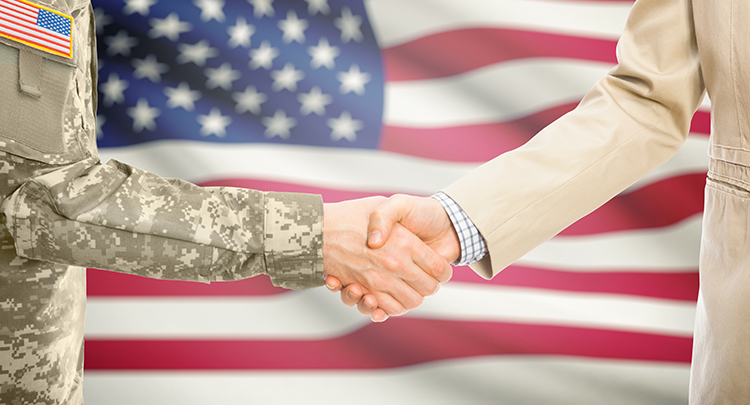ABA Military Pro Bono Project has been connecting volunteer attorneys to servicemembers in need for 15 years

Image from Shutterstock.
It hardly makes sense to ask military members to make the ultimate sacrifice for our country—and then deprive them of access to legal services, says Pamela Stevenson, chair of the ABA Standing Committee on Legal Assistance for Military Personnel.
 Pamela Stevenson served in the U.S. Air Force for 27 years, retiring as a colonel.
Pamela Stevenson served in the U.S. Air Force for 27 years, retiring as a colonel.“When people raise their hand and swear an oath to the Constitution to defend it against all enemies, foreign and domestic, up to and including giving my life for the promise of America, then we owe that individual and their family as much support as possible,” says Stevenson, who retired from the U.S. Air Force as a colonel in 2011 after 27 years of service.
Stevenson has seen firsthand how much this support is needed. She was working as an instructor at the Air Force Judge Advocate General’s School in Alabama when she became a liaison to the Standing Committee on Legal Assistance for Military Personnel. She and other members began discussing how to provide free legal services to military members and their families in various types of civil matters, including family law, consumer protection and landlord-tenant issues.
“We don’t pay them large salaries and we demand a lot,” says Stevenson, now a state representative in Kentucky and candidate for the state’s attorney general. “Oftentimes, they are on orders to move and must move as directed in a certain time frame. … It is difficult, painful and expensive for the family to deal with legal issues long-distance, and many give up.”
Because military attorneys can only provide limited services to members, they are typically unable to assist with their problems in court, Stevenson adds.
15 years of service
In 2008, the Standing Committee on Legal Assistance for Military Personnel launched the ABA Military Pro Bono Project, the only national legal program that addresses the access-to-justice gap for military families. This program accepts case referrals from military attorneys on behalf of junior-enlisted active-duty military personnel and their families. It then places these cases with pro bono lawyers from private firms around the country. Over the last 15 years, the Military Pro Bono Project has accepted more than 2,300 cases. According to the Standing Committee on Legal Assistance for Military Personnel, more than 3,000 pro bono lawyers and coordinators have registered with the program and donated nearly $18 million in services.
Nick Hasenfus is an associate in Holland & Knight’s Boston office and served on the Standing Committee on Legal Assistance for Military Personnel from 2019 to 2022. As the pro bono chair of his firm’s Veterans Group, he also manages its long-running involvement with the Military Pro Bono Project.
For Hasenfus, who was a sergeant in the U.S. Marine Corps and deployed to Iraq and Afghanistan before attending law school, it was important to share his personal experience with both the committee and the project. Unlike many veterans who are lawyers, he enlisted in the military before he went to college, he says.
“The Military Pro Bono Project generally is directed toward enlisted members E6 and below, which is the pay grade or rank,” Hasenfus says. “I was E5. I would have qualified for these services. Most of the [other] folks are retired officers, who maybe have a different perspective.”
Hasenfus and his colleagues at Holland & Knight—which has received the ABA Military Pro Bono Project Outstanding Services Award each year for more than a decade—have handled 75 cases in the last five years. While he is currently working on a case involving Social Security disability insurance, he has seen others where military members encountered predatory lending or a child in their family needed an individualized education plan.
“These are things that would be very challenging for a younger enlisted member of the military, typically between the ages of 19 and 25, to figure out on their own,” says Hasenfus, who adds that attorneys also benefit by bringing their expertise to the table and supporting people who are serving our country.
“This is something that feels good,” he says. “People feel good about helping a service member.”
On the home front
 Kensye Wood was able to help a pro bono client settle a dispute with a homeowners association that began while her client was deployed.
Kensye Wood was able to help a pro bono client settle a dispute with a homeowners association that began while her client was deployed.Kensye Wood, a second-year associate in Holland & Knight’s Denver office, began working on her first case for the Military Pro Bono Project in July. She spent about 80 hours representing a client who mistakenly missed a payment to her homeowners association after she deployed. According to Wood, her client tried to correct the issue but was locked out of her account, asked to pay opposing counsel’s attorney fees and threatened with litigation.
“It felt really great to do this work, because it was just wrong what the HOA and opposing counsel were trying to do because she was deployed,” says Wood, who helped her client settle the matter for about half of what she expected to pay the homeowners association. “It was likely the most rewarding matter I worked on last year, and especially as a first-year handling clients, it felt so personal.”
Wood also received an individual ABA Military Pro Bono Project Outstanding Services Award for her work on the case.
The Standing Committee on Legal Assistance for Military Personnel additionally manages Operation Stand-By, a program in which military attorneys ask pro bono attorneys for general guidance on specific areas of the law. Nearly 300 attorneys have signed up for this initiative since 2008.
Stevenson hopes more lawyers and their firms volunteer to help military members and their families, either through the Military Pro Bono Project or Operation Stand-By.
“This is our opportunity to make sure they stay focused on their military service while their legal matters are being handled,” she says. “It is the opportunity to make sure that America’s military remains strong by lessening one of the more troubling aspects of service, moving often and being without legal representation when an issue arises.”
For more information on these programs, visit the Standing Committee on Legal Assistance for Military Personnel’s website.



